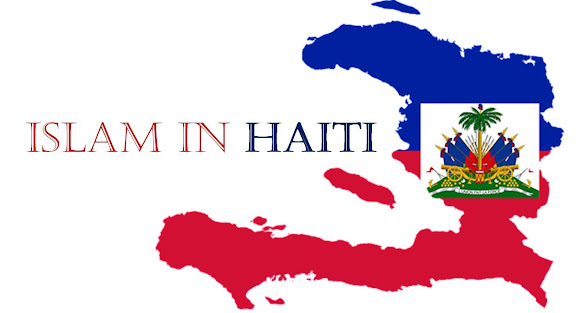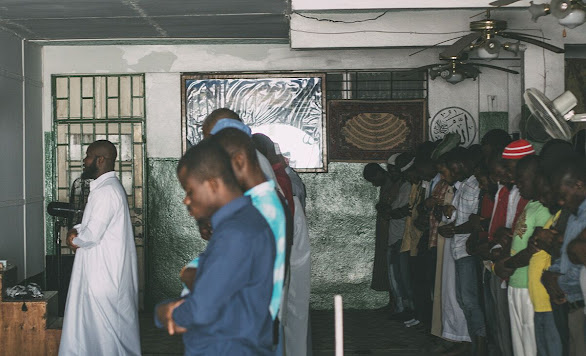In our series of posts on Islam and life of Muslims in non-Muslim countries, today we have chosen Haiti, the Caribbean nation which has been otherwise closely associated with the African-derived faith of voodoo, has a small yet growing community of Muslims. Islam made inroads to Haiti from Africa in the 16th century during the slave trade period. But by the passage of time, Islam started to fade until recently it was revived by Moroccan immigrants.
As of now there is a small minority of 4,000-5,000 Muslims forming between 0.034 and 0.042% out of the total population of 11.7 million, composed mainly of foreign immigrants with some local converts. But reports say that Islam is gaining foothold on the Island. There has been no official tally on how many Haitians have converted to Islam, a religion still not recognized by the Haitian government. However, Muslims are free to proselytize and build places of worship in the country. Therefore, a number of mosques and Islamic organizations are present in the country.
"After the earthquake we had a lot of people join," said Robert Dupuy, an imam or Islamic spiritual leader in the capital. "We were organized. We had space in the mosques to receive people and food to feed them."
The At-Tawheed Mosque in downtown Port-au-Prince [Photo]According to some estimates there are at least 5,000 Haitians who have converted to Islam in the past 20 years in Haiti. In 2016, the Ministry of Foreign Affairs and Worship officially listed 36 mosques and around 50 Koranic schools.
There has been a noticeable increase in followers since the 2010 earthquake that killed more than 300,000 people and left more than 1 million others homeless. People of many religions arrived in Haiti following the earthquake to lend assistance. But Muslim convert Kishner Billy, who hosts a nightly TV program, said that Muslims appear to have had the most lingering impact.
As per a report published on the VOA news, School teacher Darlene Derosier, a mother of two, helped build one of the mosques in her neighborhood. She said she converted to Islam after losing her home in the earthquake and the death of her husband a month later.
Muslims can practice their religion freely and Islamic studies are available. Haitian Muslim |Bilal Mosque and Islamic Center in Cap-Haïtien, which offers programs in Islamic studies and daily prayers. Other notable organizations include Masjid Shaheed Haiti Miragoâne Mosque in Miragoâne in Port-au-Prince. Masjid Al-fatiha masjid Annour & Masjid Tawhid Haiti laid] and is near completion. Listening to Adhan, the Muslim call for prayer is a common sign. "Among the market women haggling over prices while portable radios blare popular Haitian “compas” music, the muezzin’s call to prayer goes forth from a new Islamic masjeed, or prayer center."
While looking for references and information on Islam in Haiti, being from Pakistan, one piece of information specially caught my eye - a great tribute to the selfless effort of an individual, indeed:
In Gonaives, Mosque-al-Munawwar is the first mosque built by a Pakistani army officer, Major Saifullah while serving in MINUSTAH and named after his father Munawar Sultan Randhawa (a veteran Pakistani athlete) in 2008. This mosque has since been serving as a hub for charity works and was handed over to newly-converted Muslim locals. After the 2010 earthquake a number of Islamic organizations and relief groups visited the country with the purposes of rendering aid.
Mosquee Al-Fatiha, Haiti [Photo]
Muslims take active part in the affairs of local communities and representation in government offices. Nawoon Marcellus, who comes from the northern city of San Raphael, recently became the first Muslim elected to the Chamber of Deputies, Haiti’s lower house of Parliament, quotes a report published in the Arab News in 26 January 2013.
Muslim Haitian women offering prayer [Photo]
As mentioned before, the Haitian government does not recognize Islam as a religion, nor does it honor Muslim marriages. Wearing the skullcaps or flowing head scarves typical of the religion can draw stares and finger-pointing. Derosier said her neighbors' gossip that she's evil.
Muslims can be easily spotted in the communities. Muslim men distinctive in their kufi headwear and finely groomed beards, and women in traditional scarves, are now seen on the streets of several cities.
You may watch a short video on Islam in Haiti:
Disclaimer: The data for this post has been collected from the references given below. If anyone differs with the material contained in this post, one may consult the references and their authors. If someone has more material about the subject, he/she is most welcome to share in the comments box to make the post all encompassing.
To know more about life of Muslims in other non-Muslim countries, please visit our page: Islam and Life of Muslims in Non Muslim Countries
You may also refer to our Reference Pages for knowing more about Islam and Quran.
You may also refer to our Reference Pages for knowing more about Islam and Quran.
If you like Islam: My Ultimate Decision, and to keep yourself updated on all our latest posts to know more about Islam, follow us on Facebook
Follow @IslamUltimate
Please share this page to your friends and family members through Facebook, Twitter, WhatsApp or any means on social media so that they can also be benefited by it and better understand Islam and the Holy Qur'an - Insha Allah (Allah Willing) you shall be blessed with the best of both worlds.























0 comments:
Post a Comment